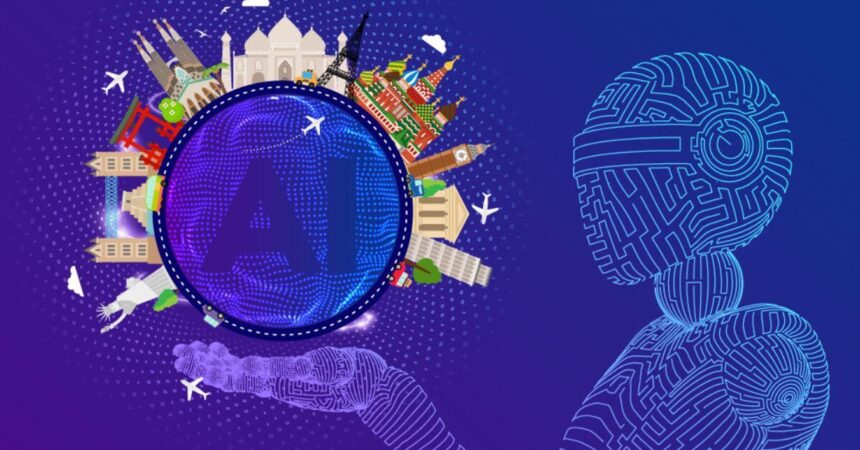The tourism industry is one of the largest and fastest-growing industries in the world. In recent years, the rise of technology and artificial intelligence (AI) has revolutionized the way people travel and experience new destinations.
From personalized recommendations to streamlined booking processes, AI is transforming the tourism industry and improving the traveler experience.
Improving the Traveller Experience
Artificial intelligence (AI) is revolutionizing the travel and tourism industry, and it has the potential to significantly improve the traveler experience.
With the rise of big data, machine learning, and natural language processing, AI technology can provide customized recommendations, intelligent recommendations, and real-time personalization for travelers.
For instance, chatbots powered by AI can help travelers plan their trips by providing quick answers to frequently asked questions, making reservations, and even booking flights and hotels.
With natural language processing, chatbots can understand the context and provide relevant information, thereby reducing the time and effort required by travelers to plan their trips.
AI-powered personalization engines can analyze traveler data to provide tailored recommendations for activities, restaurants, and attractions. For instance, AI algorithms can analyze travelers’ previous trips and their interests to suggest destinations that they might like.
Similarly, AI-powered customer service systems can help airlines and hotels to provide personalized service to their customers.
Moreover, AI technology can also help to enhance the travel experience by providing real-time information and updates. For example, AI-powered voice assistants can provide travelers with information about flight delays, gate changes, or weather updates.
Streamlining the Booking Process
With the help of AI technology, the travel and hospitality industry is becoming more efficient and user-friendly. AI-powered chatbots, for instance, are now used by many travel agencies and hotel chains to handle customer inquiries and reservations.
This technology streamlines the booking process and eliminates the need for human intervention, thus providing a faster and more convenient way for customers to plan and book their trips.
AI-powered chatbots use natural language processing (NLP) and machine learning algorithms to understand and respond to customer inquiries in real-time. Customers can ask questions about flight and hotel availability, prices, and other related information.
The chatbot will then provide relevant information and even make reservations on behalf of the customer. This eliminates the need for customers to wait on hold or speak to a representative, saving them time and reducing frustration.
Moreover, AI-powered chatbots can be programmed to understand and respond to multiple languages, making it easier for customers from different countries to make reservations.
They can also handle multiple queries at the same time, providing quick and efficient customer service. This is particularly useful during peak travel seasons when many customers are trying to make reservations at the same time.
AI technology is also used to personalize travel recommendations for customers based on their preferences and travel history. For instance, if a customer has previously booked a trip to a particular destination, the chatbot may suggest similar destinations or experiences that the customer may be interested in. This personalized touch enhances the customer experience and makes them feel valued.
Enhancing Customer Service
The tourism industry is one of the fastest-growing and most competitive industries in the world. With the rise of technology and artificial intelligence, the industry is rapidly evolving to meet the demands of consumers and improve customer experience.
The use of AI in tourism has already been shown to greatly enhance customer service, streamline operations, and increase overall satisfaction for both tourists and industry professionals.
One of the most significant ways AI is being utilized in the tourism industry is through chatbots and virtual assistants. These AI-powered tools can provide customers with quick and accurate information, 24/7.
They can assist with booking travel arrangements, answer frequently asked questions, and provide personalized recommendations based on customer preferences and behavior. These chatbots and virtual assistants significantly reduce wait times and improve the overall customer experience by providing instant support.
Another way AI is being utilized in the tourism industry is through personalized recommendations and targeted advertising.
AI algorithms can analyze customer data, including search history and purchasing behavior, to provide tailored recommendations and advertisements to each customer. This can help drive sales and improve customer satisfaction by offering a more personalized experience.
AI is also being used to streamline operations in the tourism industry. For example, AI-powered systems can automate tasks such as hotel check-in and check-out, helping to reduce wait times and improve the overall customer experience.
These systems can also assist with predictive maintenance and inventory management, reducing downtime and increasing efficiency for hotels and resorts.
Challenges and Considerations
While the benefits of AI in the tourism industry are clear, there are also some challenges and considerations to take into account. For example, the use of AI in customer service may result in a loss of personal touch and human connection, which can be a critical aspect of the tourism experience.
Additionally, there is a risk that AI systems may not always provide accurate or trustworthy information, which can lead to a negative experience for travelers.
One of the challenges faced by AI in tourism is the lack of data availability. Travel data is vast and complex and must be processed accurately for AI algorithms to be effective.
Another challenge is the integration of AI systems with existing platforms and infrastructure, which can be time-consuming and costly. In addition, ensuring that AI systems are secure and safeguarded against cyber threats is critical.
Privacy and ethics considerations are also important aspects of AI in tourism. Travelers are often concerned about the security of their personal information and the way it is being used. Tour operators and travel providers must be transparent in their data management practices and comply with relevant privacy laws and regulations.
Another consideration is the impact of AI on job loss in the tourism industry. AI systems can automate many tasks, such as booking and customer service, which can lead to job loss for human employees. Companies must balance the benefits of AI with the need to ensure that employees are trained and retrained for new job roles.
Moreover, the implementation of AI in the tourism industry requires significant investment, which may not be feasible for smaller companies or organizations. It is also essential to consider privacy and data protection when using AI, as the use of personal information can raise concerns among travelers.
Conclusion
The use of artificial intelligence in the tourism industry is revolutionizing the way people travel and experience new destinations. From personalized recommendations to streamlined booking processes, AI is enhancing the traveler experience and transforming the industry. Businesses are now also creating AI applications for their business.
While there are challenges and considerations to take into account, the benefits of AI in the tourism industry are clear and are likely to continue to grow in the future. The future of tourism is here, and it’s powered by AI.



